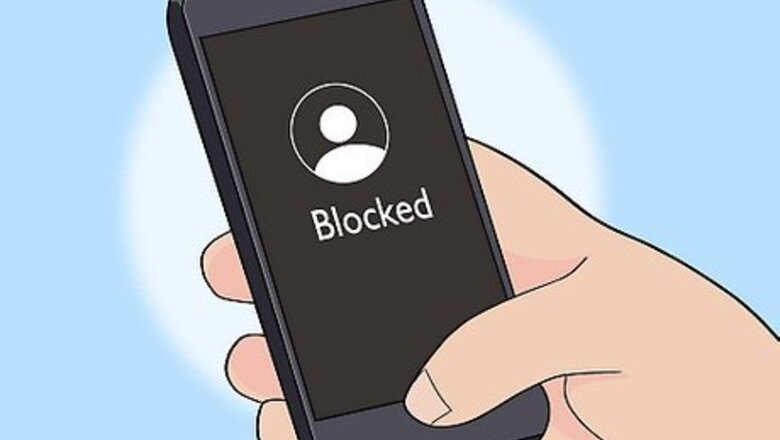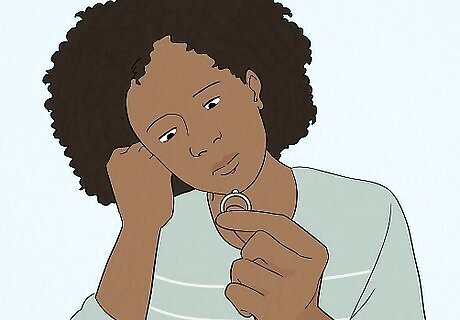
views
- After the affair, cut off contact with the person you cheated with and tell your spouse what happened. Apologize for your actions and listen to his perspective.
- Consider seeking out therapy, schedule time to care for yourself, give each other space to heal, and know that some days may be harder than others.
- There are many reasons why people cheat—they may have been angry, have low self-esteem, or tried to fill a need that was missing in their relationship.
I Cheated On My Husband: What Do I Do Now?

Cut off contact with the person you cheated with immediately. If you want to win your husband back after the affair, immediately cutting off communication with the other person is crucial to the healing process of your relationship. Tell the other person that you want to cease all contact, delete their phone number, and block their social media accounts. The first step in building trust is showing you’re committed to making a change. By stopping all communication with the person you cheated with, you’re showing that your first priority is repairing your relationship with your spouse. It also removes the temptation to restart the affair.

Tell your spouse what happened. Lying is a major part of cheating, which is why it’s important to be honest about the affair moving forward. Be completely transparent about the situation, and be open to answering any and all questions your husband may have. Admitting your mistake and taking full responsibility for your actions can show your spouse that you regret cheating. Can this be incredibly hard and scary? Of course. But directly stating what you did wrong and why you regret it can go a long way when rebuilding trust. Resist any urge to blame your partner for your infidelity. It might be tempting to explain why you cheated by saying that you had needs that were missing during the relationship. And that makes sense, nothing happens in a vacuum. However, bringing up those issues now might sound like you're not fully aware of the weight of your infidelity, which could risk you and your husband's ability to reconcile.

Apologize for your actions and make a commitment not to repeat the mistake. There are few words more powerful than “I’m sorry.” Be genuine when you say what you’re sorry for, and make sure that what you say directly relates to the actions you committed that caused harm. If you promise never to cheat again, hold up the end of your promise and make yourself accountable. Placing emphasis on what you did wrong can show that you know you made a mistake. Try saying, “I’m sorry for what I did” instead of “I’m sorry that this hurt you.” Apologizing for cheating can feel so difficult and stressful. When you get stuck, take a moment to breathe and think. As long as you're leading with patience, honesty, and love, you're probably offering a valuable, heartfelt apology. Reader Poll: We asked 280 wikiHow readers who’ve cheated, and 60% of them agreed the biggest challenge in rebuilding trust is dealing with the emotional fallout and broken trust. [Take Poll]

Listen to what your husband has to say. When you talk to your husband about the affair, carefully and actively listen to his point of view. Practicing reflective listening can validate your partner’s emotions and reduce any chance of misinterpretation. When your partner expresses his emotions, rephrase and repeat back what he says. For example, if he says, “I don’t understand why you did this to us,” say “What I’m hearing is that you’re not sure why I would hurt our relationship by cheating.” This let's him know that you're engaged and you understand. Your husband might be angry, and he might not always lead with kindness. Do your best to listen respectfully: he's hurt, and trying to make sense of his betrayal.

Sometimes, this giant conversations can be too much for two people to handle. If you feel that you're experiencing barriers to your communication, ask your partner if he'd be open to speaking with a marriage counselor instead.

Decide whether you want to continue your relationship. Before choosing to continue or end your marriage, first, take some time for both of you to heal and understand what problems were behind the affair. Now that you've been honest, the truth is out. It's time for the both of you to think deeply about what that means to you both. It can be extremely hard, but having a conversation with your spouse about whether or not to continue your relationship will save you both from hurt in the long run. Therapy, journaling, and time spent with friends are all healthy strategies that can help you come to a decision.

Give each other space to heal. Rebuilding trust takes plenty of time and patience. You might find yourself acting in unpredictable ways or doing things you don't normally do as you both try to understand what happened. Give yourself and your partner time, and try to avoid any more emotionally charged discussions as you two begin the healing process. This can be so hard. When your partner is still making up their mind, it might feel impossible not to call or text before they're ready. But remember: he needs his space to decide what's best for him, and he needs to know that you respect him enough to offer that. Continue being transparent with your spouse to build up trust. The level of transparency is up to the two of you — you might give up activities that don’t make him comfortable, tell him where you’re going and who you’re going with, or even give your partner access to your email and text messages. At some point, you'll surely phase out of this, but in the short term, it can help him move to a place of trust more quickly.

Consider seeking marriage counseling. Building trust is an ongoing process, but you don’t have to go through it alone. A marriage counselor can help put the affair into perspective, identify issues that might have contributed to the affair, and teach ways to rebuild and strengthen the marriage. If you decide to end the relationship, a marriage counselor can help you work towards separating in a constructive way. Choose a counselor who can empathize with you and help you both heal as individuals. If you have children, a family counselor can help you and your husband work through your relationship while keeping the children’s well-being in mind.

Know that some days will be harder than others. Recovering from an affair can be one of the most challenging times in a marriage. There may be days when you feel overwhelmed by mixed feelings and uncertainty. However, when spouses rebuild trust, accept responsibility for their actions, resolve conflict, and forgive, they may also deepen and strengthen their love and affection for one another. Take care of yourself throughout the healing process. If your relationship with your husband gets to be too much, don’t be afraid to reach out to friends, family, or a mental health professional for help.
Why do people cheat?

They cheat out of anger or revenge. Some people cheat as a way to seek revenge for something their partner has done to them. If their partner has betrayed them or harmed them emotionally, they might have been motivated to cheat out of anger.

Some people cheat to raise their low self-esteem. It can be tempting to cheat if the partners you cheat with take you out to dinner or shower you with compliments. Seeking multiple partners might have been a way to increase their self-esteem or exercise their independence as an individual.

Lack of love can also lead to cheating in a relationship. They may have fallen out of love with their partner or lost passion or interest in the relationship. If they felt a lack of love in your relationship, they may try to fill that void by pursuing other people.

One partner might have felt that they need more variety. They might have wanted to explore their options and see what’s out there. Instead of breaking up with their partner, they may have wanted to experience sex or romance with as many partners as possible while they’re still anchored to a relationship.

If they feel neglected, a person might be tempted to cheat. They might not have felt like they got enough love, respect, or attention from their partner. So, they filled that void by seeking a relationship with another person. Women are more likely to be motivated by neglect to cheat, while men are more likely to cheat because of sexual desire, variety, and situational forces.

Their sexual desire can’t be fulfilled by their current relationship. They might have felt unsatisfied with the sex in their relationship and wanted to try something new. If the cheater felt unsatisfied with their current partner, the affair might also have been a way to withdraw from the relationship without actually breaking up with the other person.

They were in a situation that was out of the person’s control. This includes any scenarios that may be outside of the person’s normal behavior. They might have been drunk, on vacation, or under high amounts of stress, which caused them to cheat and act in ways that they wouldn’t normally. You may also be depressed, and the affair acts as a distraction from the emptiness you feel. If you feel like you may be depressed, consider seeking out therapy, call SAMHSA’s National Helpline at 1-800-662-4357, or text your zip code to 435748.
You Deserve to Feel Supported, Too

Seek out individual therapy to help support your emotional journey. Taking the extra step of seeking therapy can help you understand why you cheated in the first place. Most of the time, affairs are because the cheater was going through something they aren’t able to communicate effectively to their partner. Find a mental health professional you like and feel like you can open up to. You may discover things about yourself that you weren’t conscious of before, and this can go a long way toward making lasting change for the better. As you reflect on your relationship, it’s important to remember that you and your spouse may develop skills or weaknesses that can affect how you both communicate going forward. Take time to get to know yourself and cope with the pain that may come.

Seek support from friends and family to keep you feeling loved. After an affair, you may be reluctant to reach out to friends and family for fear of being judged. However, it can help you process your emotions when you reach out to trusted friends or loved ones who support and encourage you. Make time not only to talk about your marriage issues with your friends and family but to also have fun together. Organize time to do something fun and stress-free each week, like going to a movie, grabbing coffee, or taking a walk.

Schedule self-care. Often, cheating hurts the cheater, too. After the affair, you may feel anxiety, guilt, shame, regret, confusion, or embarrassment. Make sure not to neglect your mental and physical health. Get at least 30 minutes of exercise each day, eat healthy, regular meals, and stick to a healthy sleeping schedule. Practicing gratitude can also help you focus on the positive. Remind yourself daily of things that you’re grateful for, even if it’s as simple as appreciating the meal you ate that day. Write them down in a list each night before you go to sleep to promote positive thinking.




















Comments
0 comment